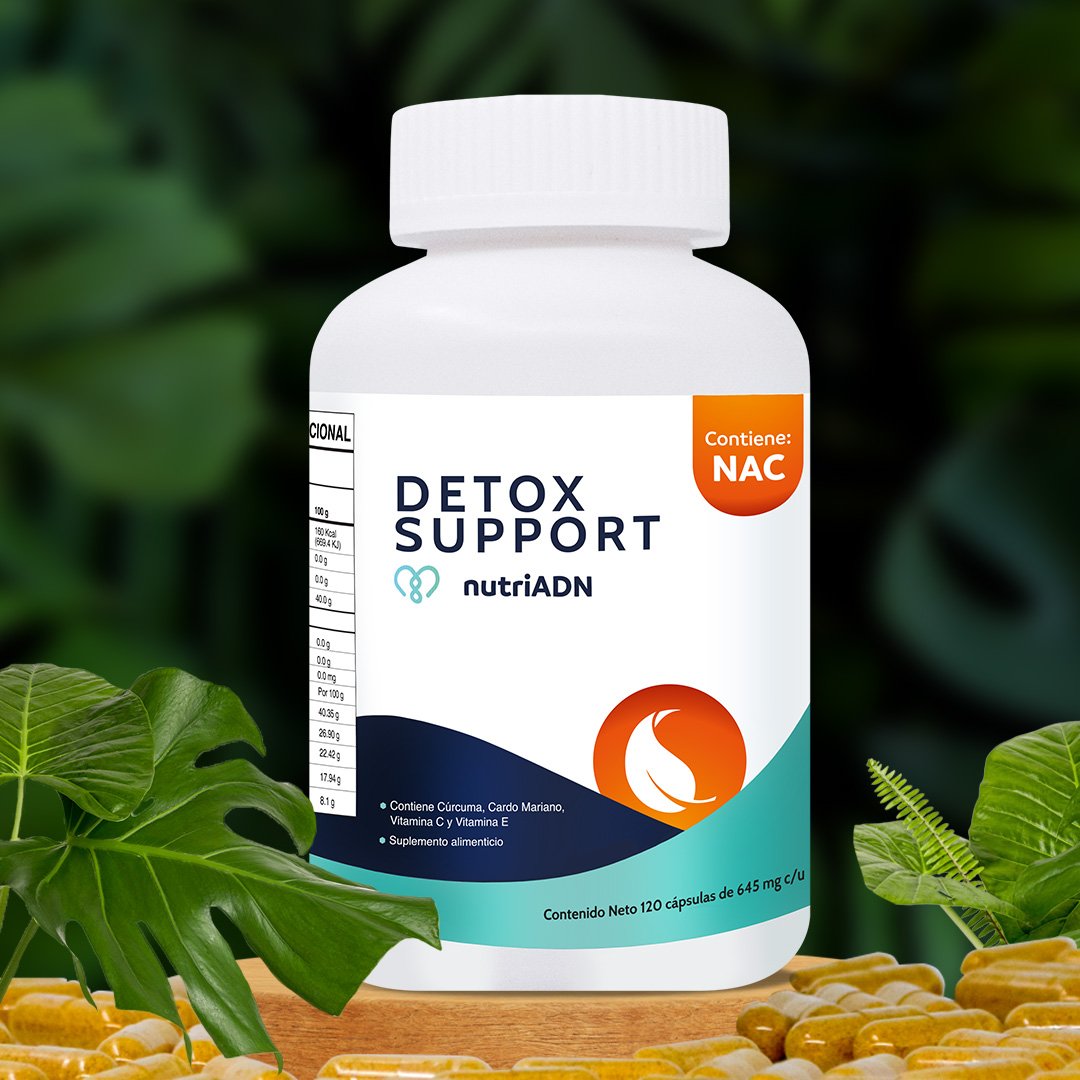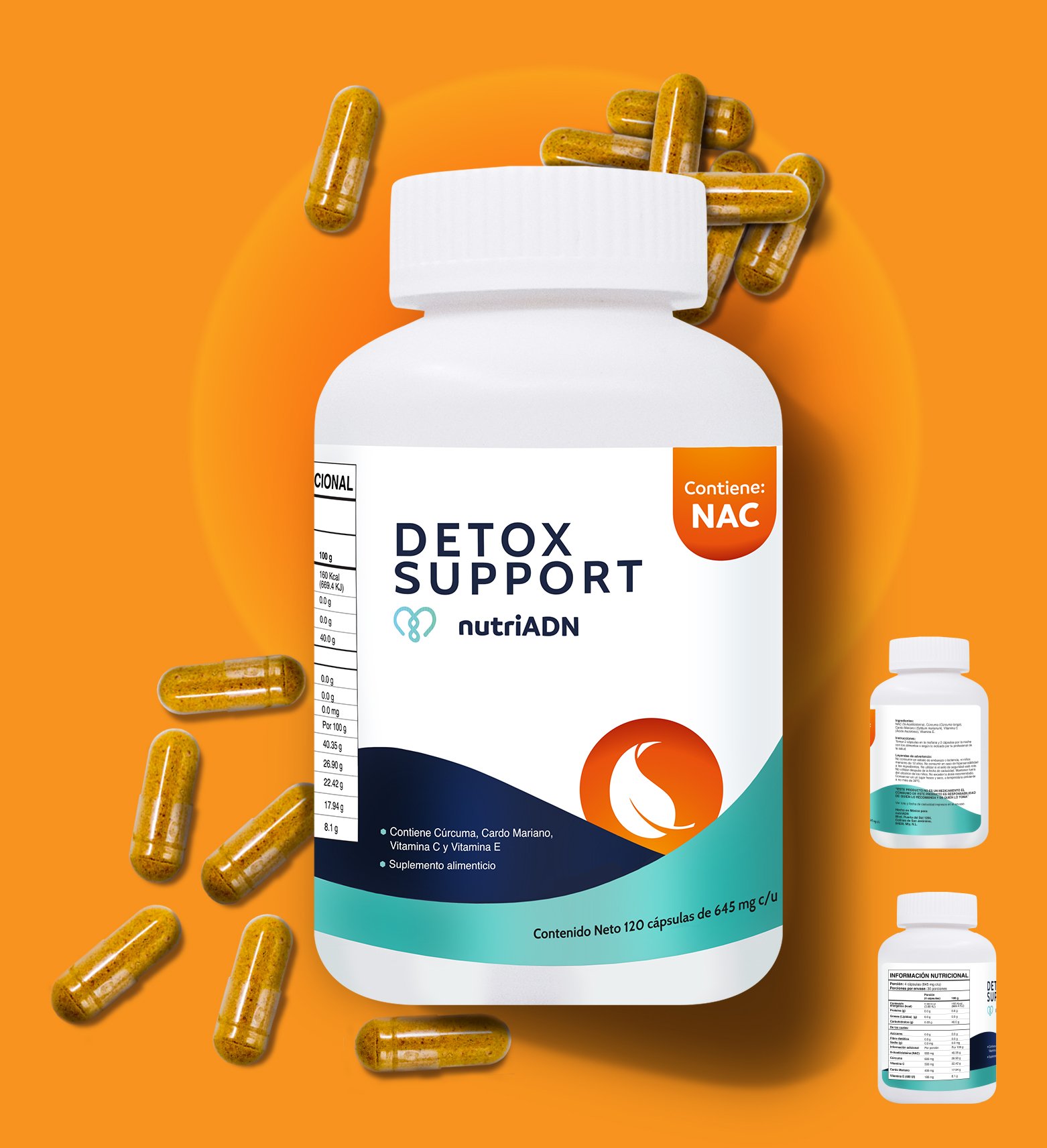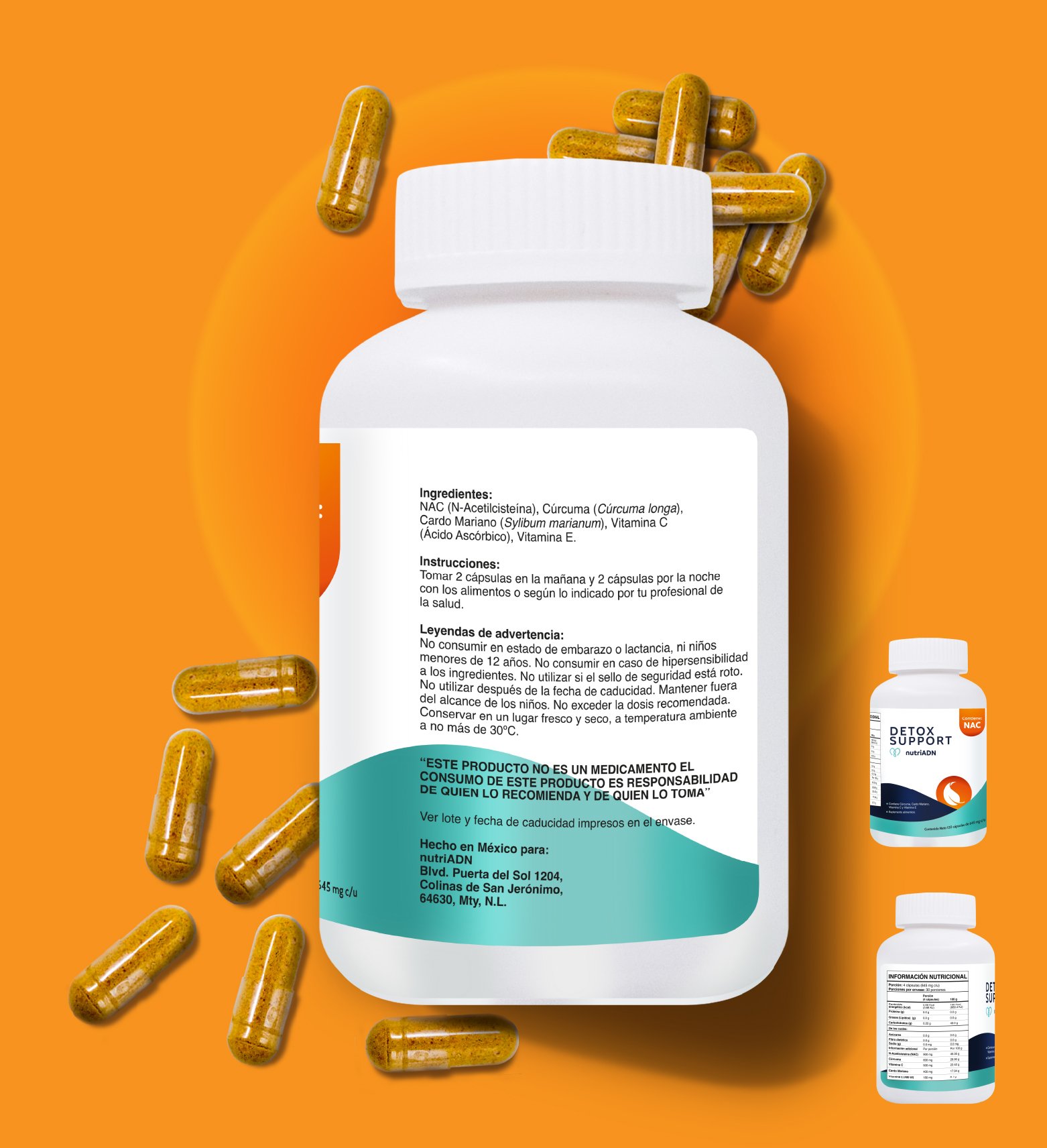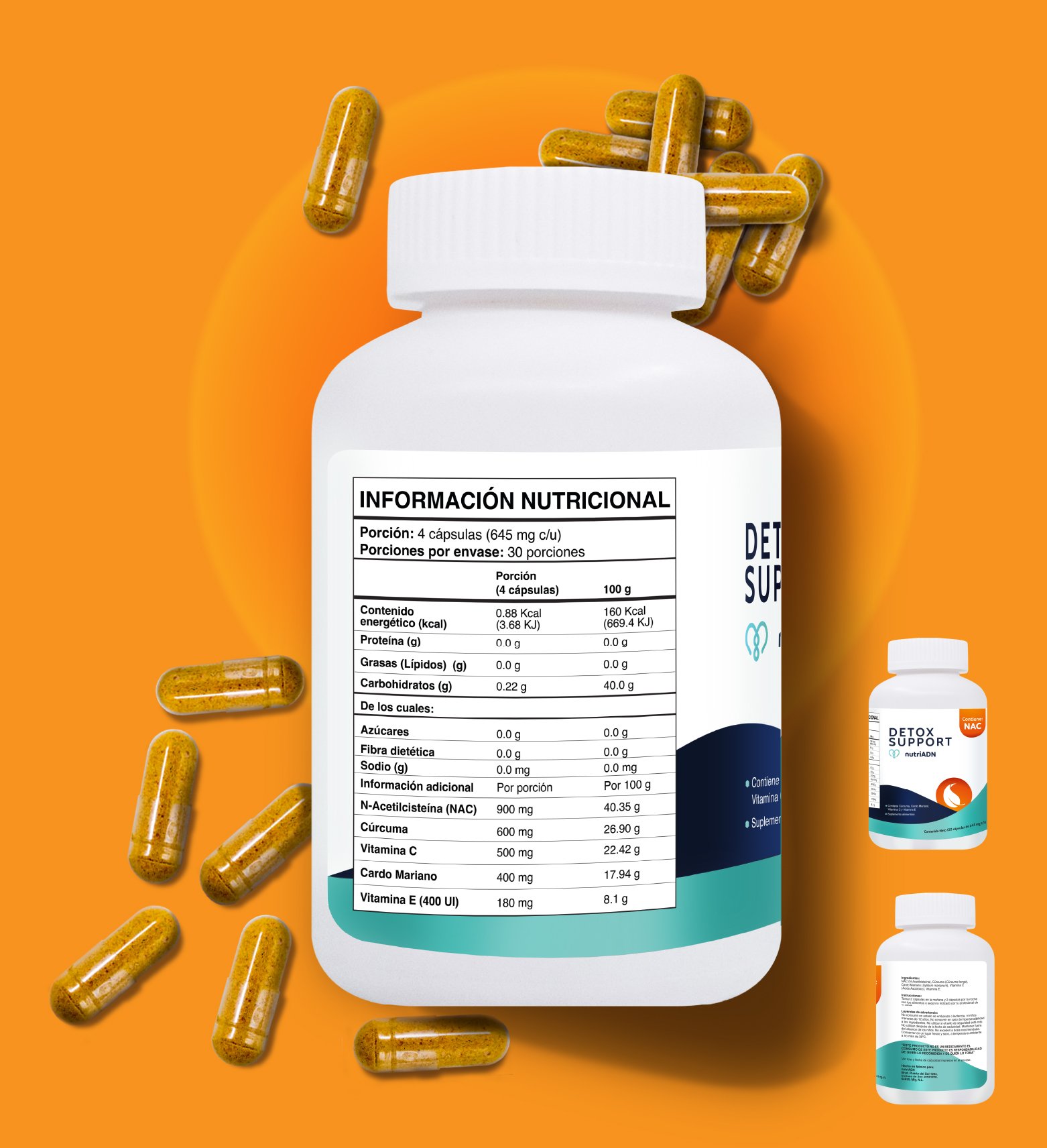



Detox Support
Nuestra fórmula de 120 cápsulas aporta el beneficio de distintos ingredientes cómo: NAC (N-acetilcisteína), Cardo Mariano, Cúrcma, Vitamina C y Vitamina E.
La combinación de todos estos ingredientes puede apoyar en la defensa antioxidante y al proceso de desintoxicación hepática.
$790.00 MXN
¿Quién necesita este producto?
Para personas que deseen apoyar al procesamiento hepático de: disruptores hormonales, toxinas, contaminación y hormonas. Este producto también podría funcionar como apoyo para tratar hígado graso y el funcionamiento del mismo.
Ingredientes Clave
NAC | 900 mg
Se ha usado en daño hepático inducido por el uso prolongado de medicamentos. Además, actúa como auxiliar en la producción del glutatión.
Cúrcuma | 600 mg
Actúa como apoyo para la producción de glutatión, para la defensa antioxidante del organismo y también en la actividad de las enzimas encargadas de la desintoxicación.
Cardo mariano | 400 mg
Actúa como apoyo en la función hepática. Apoya en la excreción de metales pesados y otras toxinas que pueden dañar al hígado y a otros órganos.
Vitamina C | 500 mg
Podría ayudar a elevar los niveles de glutatión en los linfocitos y en los glóbulos rojos.
Vitamina E | 180 mg
Auxiliar para incrementar las concentraciones de glutatión, así como la capacidad antioxidante del cuerpo. Podría fungir como apoyo en la reducción de los marcadores inflamatorios, proteína C reactiva y marcadores del metabolismo de la insulina.
¿Cómo utilizar este producto?
Consumir 4 cápsulas de preferencia con alimentos. No exceder de la porción recomendada.
Información Nutricional
Referencias Científicas
Farzaei, M. H., Zobeiri, M., Parvizi, F., El-Senduny, F. F., Marmouzi, I., Coy-Barrera, E., ... & Abdollahi, M. (2018). Curcumin in liver diseases: a systematic review of the cellular mechanisms of oxidative stress and clinical perspective. Nutrients, 10(7), 855.
Rivera‐Espinoza, Y., & Muriel, P. (2009). Pharmacological actions of curcumin in liver diseases or damage. Liver International, 29(10), 1457-1466.
Nabavi, S. F., Daglia, M., Moghaddam, A. H., Habtemariam, S., & Nabavi, S. M. (2014). Curcumin and liver disease: from chemistry to medicine. Comprehensive Reviews in Food Science and Food Safety, 13(1), 62-77.
Wang, Y., Liu, F., Liu, M., Zhou, X., Wang, M., Cao, K., ... & Feng, X. (2022). Curcumin mitigates aflatoxin B1-induced liver injury via regulating the NLRP3 inflammasome and Nrf2 signaling pathway. Food and Chemical Toxicology, 161, 112823.
García-Niño, W. R., & Pedraza-Chaverrí, J. (2014). Protective effect of curcumin against heavy metals-induced liver damage. Food and Chemical Toxicology, 69, 182-201.
Gillessen, A., & Schmidt, H. H. J. (2020). Silymarin as supportive treatment in liver diseases: A narrative review. Advances in therapy, 37(4), 1279-1301.
Foti, R. S., & Wahlstrom, J. L. (2008). The role of dietary supplements in cytochrome P450-mediated drug interactions. Boletin Latinoamericano y del Caribe de Plantas Medicinales y Aromaticas, 7(2), 66-84.
Alrawaiq, N. S., & Abdullah, A. (2014). A review of antioxidant polyphenol curcumin and its role in detoxification. Int J Pharm Tech Res, 6(1), 280-289.
Nouri‐Vaskeh, M., Malek Mahdavi, A., Afshan, H., Alizadeh, L., & Zarei, M. (2020). Effect of curcumin supplementation on disease severity in patients with liver cirrhosis: A randomized controlled trial. Phytotherapy research, 34(6), 1446-1454.
Barthelemy, J., Sanchez, K., Miller, M. R., & Khreis, H. (2020). New opportunities to mitigate the burden of disease caused by traffic related air pollution: antioxidant-rich diets and supplements. International journal of environmental research and public health, 17(2), 630.
Reszka, E., Wasowicz, W., & Gromadzinska, J. (2006). Genetic polymorphism of xenobiotic metabolising enzymes, diet and cancer susceptibility. British Journal of Nutrition, 96(4), 609-619.
Hall, D. C. (2001). Nutritional influences on estrogen metabolism. Applied nutritional science reports, 1, 1-8.
Suzuki, T., Hidaka, T., Kumagai, Y., & Yamamoto, M. (2020). Environmental pollutants and the immune response. Nature Immunology, 21(12), 1486-1495.
Tighe, S. P., Akhtar, D., Iqbal, U., & Ahmed, A. (2020). Chronic liver disease and silymarin: A biochemical and clinical review. Journal of clinical and translational hepatology, 8(4), 454.
Gillessen, A., Schmidt, H.HJ. Silymarin as Supportive Treatment in Liver Diseases: A Narrative Review. Adv Ther 37, 1279–1301 (2020). https://doi.org/10.1007/s12325-020-01251-y
Cline, J. C. (2015). Nutritional aspects of detoxification in clinical practice. Alternative Therapies in Health & Medicine, 21(3).
Piper, J. T., Singhal, S. S., Salameh, M. S., Torman, R. T., Awasthi, Y. C., & Awasthi, S. (1998). Mechanisms of anticarcinogenic properties of curcumin: the effect of curcumin on glutathione linked detoxification enzymes in rat liver. The international journal of biochemistry & cell biology, 30(4), 445-456.
Ntamo, Y., Ziqubu, K., Chellan, N., Nkambule, B. B., Nyambuya, T. M., Mazibuko-Mbeje, S. E., ... & Dludla, P. V. (2021). Drug-induced liver injury: clinical evidence of N-acetyl cysteine protective effects. Oxidative medicine and cellular longevity, 2021.
ESTE PRODUCTO NO ES UN MEDICAMENTO. EL CONSUMO DE ESTE PRODUCTO ES RESPONSABILIDAD DE QUIEN LO RECOMIENDA Y DE QUIEN LO USA.
No exceder la porción diaria recomendada.
Seguir las instrucciones de uso que aparecen en la etiqueta.
Conservar el producto en un lugar fresco y seco. Mantener fuera del alcance de los niños, No se administre a menores de 18 años.
Personas con alguna condición médica específica consultar a su médico antes de consumir este producto.
NO SE RECOMIENDA SU USO EN MUJERES EMBARAZADAS Y/O EN PERÍODO DE LACTANCIA SIN SUPERVISIÓN MÉDICA.





